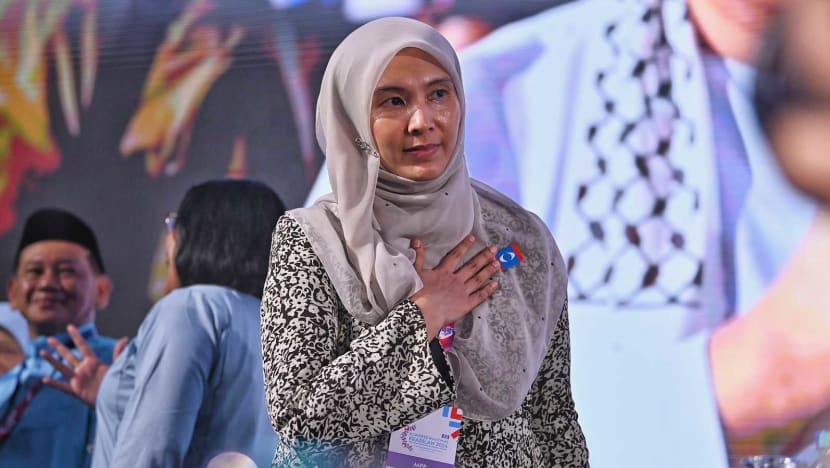Commentary: Is Nurul Izzah Anwar prime minister material?
Malaysia’s most famous political daughter must prove her worth or be left behind, says Southeast Asian politics expert Sophie Lemiere.

PKR's newly elected deputy president, Nurul Izzah, poses for a photo at the 18th PKR National Congress at the Persada Convention Centre in Johor Bahru, Johor, on May 23, 2025. (Photo: CNA/Zamzahuri Abas)

This audio is generated by an AI tool.
PARIS: Anyone who follows Malaysian politics knows the name Nurul Izzah Anwar.
The eldest daughter of Prime Minister Anwar Ibrahim, the 44-year-old newly elected deputy president of Parti Keadilan Rakyat (the anchor party of Malaysia’s governing coalition) has lived much of her life in the public eye.
Long romanticised as Malaysia’s “princess of reform” (Puteri Reformasi), Nurul Izzah gained prominence as a teenager campaigning for her father’s release after his 1998 arrest.
She later went on to become a three-term Member of Parliament and championed issues from education access to gender equality and economic inclusion.
Now, as Malaysia looks toward its next general election in 2028, her place in Malaysian politics is being scrutinised.
Her recent election as Anwar’s second-in-command in PKR has placed the spotlight back on political dynasties, and whether her rise reflects genuine leadership potential or the strategic manoeuvring of her father.
Though no official succession plan has been announced, her new position has inevitably spurred talk of whether she could one day sit where her father is sitting.
ANWAR’S REIGN
Anwar’s political career has been shaped by a keen instinct for survival and control. Shifting alliances are not unusual, and even close allies can find themselves sidelined.
Take for example Rafizi Ramli, who resigned as Minister of Economy after he lost the PKR deputy president post to Nurul Izzah.
Once hailed as a bold reformist and eloquent technocrat, Rafizi was the brains behind Pakatan Harapan’s 2018 electoral victory strategy and a key challenger to Anwar’s hegemony within PKR. But like his predecessor Azmin Ali - who fell out of favour and was systematically dismantled with Rafizi’s help - Rafizi now finds himself sidelined.
The sequence of events has led some within political circles to suggest that Nurul Izzah’s rise may have functioned, intentionally or not, to neutralise a potential rival.
And despite winning a decisive 9,803 votes to Rafizi’s 3,866, allegations of nepotism continue to undermine her independence. Many critics recall her highly controversial and short-lived appointment as Anwar’s senior economic and finance adviser in 2023.
WILL NURUL IZZAH STAND ALONE?
By the time the next general election swings by, Nurul Izzah will be around 48 years old.
Despite her years in public life, she remains politically underdeveloped. She is not a sitting MP. She has never held a ministerial portfolio typically expected of a future prime minister, or even a sizable public institution.
To be sure, male politicians have taken on Cabinet posts at a similar or younger age, and with just as little experience.
Yet the bar appears to be set higher for Nurul Izzah, as is common for women in politics across the world.
Figures like Jacinda Ardern in New Zealand, Sanna Marin in Finland and Thailand’s Paetongtarn Shinawatra have all had to navigate public scepticism.
Ardern's empathy-driven leadership drew international acclaim, but to quote another former female New Zealand prime minister, Helen Clark, she also faced “a level of hatred and vitriol which in my experience is unprecedented in our country”.
Marin’s youth was routinely questioned, and she found herself under fire after videos of her dancing at a private party with friends were leaked on social media.
Paetongtarn - daughter of Thaksin Shinawatra and niece of Yingluck Shinawatra, both of whom were former prime ministers - is currently embroiled in controversy over a leaked phone call with Cambodia’s former leader Hun Sen. Her plight has potential to end the Shinawatra clan’s hold in Thai politics.
Like Paetongtarn, Nurul Izzah must contend with the double bind of legacy, which is political capital and political baggage.
If Anwar truly believes in preparing his daughter for leadership, he must place her where she can gain the experience and legitimacy she needs.
Appointing her to a substantive ministerial role would be a controversial but more honest move than another opaque advisory post. And if Nurul Izzah has ambitions to lead, she must begin by anchoring herself in one policy area, championing it and producing measurable results.
As seen with Khairy Jamaluddin, who was once dismissed as riding on the coattails of his father-in-law, former prime minister Abdullah Badawi, credibility is earned through action. Khairy’s tenure as health minister during the COVID-19 pandemic transformed public opinion.
Nurul Izzah too needs her own moment.
If she continues to be defined by her family ties and not her achievements, she risks becoming the symbol of everything Reformasi once set out to fight: entitlement, dynasty and hollow politics.
Dr Sophie Lemiere is a political anthropologist who specialises in Malaysian and Southeast Asian politics, and has held research and teaching positions in major universities across Europe, the United States and Southeast Asia. She is currently Research Fellow at College de France in Paris.


















